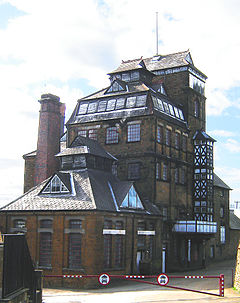(Hook Norton)
Hook Norton
|
|
|---|---|
 Hook Norton brewery is one of Britain's last working Victorian tower breweries (April 2006) |
|
|
Hook Norton shown within Oxfordshire
|
|
| Area | 22.23 km2 (8.58 sq mi) |
| Population | 2,117 (2011 census) |
| • Density | 95/km2 (250/sq mi) |
| OS grid reference | SP3533 |
| Civil parish |
|
| District | |
| Shire county | |
| Region | |
| Country | England |
| Sovereign state | United Kingdom |
| Post town | Banbury |
| Postcode district | OX15 |
| Dialling code | 01608 |
| Police | Thames Valley |
| Fire | Oxfordshire |
| Ambulance | South Central |
| EU Parliament | South East England |
| UK Parliament | |
| Website | Hook Norton Village Website |
Hook Norton is a village and civil parish in Oxfordshire, England. It is 4.5 miles (7.2 km) northeast of Chipping Norton and close to the Cotswold Hills. Many of its buildings are built of local ironstone.
In the Anglo-Saxon Chronicle in AD 922, the village is called Hocneratune. In the Domesday Book of 1086 it is called Hochenartone. Other historical spellings of the name include Hocceneretune (1050), Hogenarton (1216) and Okenardton (1263). Another variation may be 'Hegnorton' as seen in 1430. The name may possibly mean 'the farmstead of the Hoccanere tribe', the supposed tribal name deriving from the personal name 'Hocca' and Old English 'ora' (hill-slope), together with 'tun', settlement.
Today the village is colloquially known to its inhabitants as "Hooky" and sometimes as "The Hook". The village is formed of four neighbourhoods: East End, Scotland End (in the west), Down End (in the centre) and Southrop (in the south).
The Anglo-Saxon Chronicle records that a Viking army raided the Hook Norton area in AD 913, and the village had a parish church by AD 922. The Domesday Book records that in 1086 Hook Norton had 76 villagers and two mills. Reports of a band of villagers arming themselves and attempting to fight a Viking raiding party have also been made, supported by finds in nearby fields.
Hook Norton had a clockmaker, Thomas Webb, who maintained the turret clock at St. Giles' parish church, Wigginton from 1788 until 1834. Webb was succeeded in his trade at Hook Norton by John Paine, who maintained the clock at Wigginton from 1835 until 1855. In 1840 Paine built a new turret clock for St. George's parish church, Brailes, Warwickshire.
The former Banbury and Cheltenham Direct Railway, part of the Great Western Railway, served Hook Norton with a railway station at East End. British Railways closed the station in 1951 and closed the railway to all traffic in 1964. Tall stone pillars which supported two B&CDR viaducts can be seen in the valley to the south of the village.
...
Wikipedia

